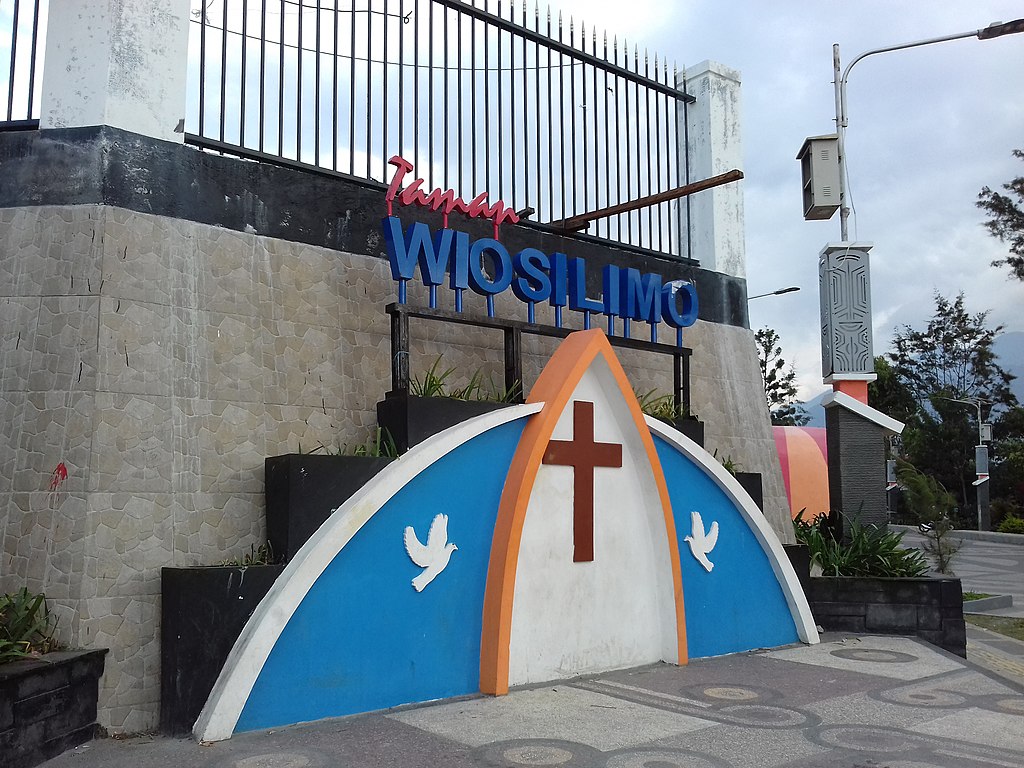
A picture of Wamena, Papua, Indonesia, from 2019.
“The protest focused on the government, and in this case the security forces, for actions that the public considers immoral.”
Indonesia has been combatting separatist insurgents in its Papua region since 1965. While the long-running insurgency has ebbed and flowed, there has been a notable increase in tempo in the last five years.[i] The excerpted article from the Papua-based Indonesian-language media outlet Seputarpapua.com describes Indonesia’s calculus in attempting to win over the Papuan civilian population despite their opposition to certain counterinsurgency operations.
The article focuses on the 17 September arrests adjacent to a Papuan church of five suspected members of the Free Papua Organization (OPM), which the Indonesian government calls the “Armed Criminal Group” (KKB). Indonesian police justified the operation by claiming the suspects’ confessions and cellphone content strengthened the evidence of their affiliations and support to KKB. According to the article, the operation enflamed local sensitivities because the house was behind a church and the officers broke down the doors of the house and scuffled with the suspects.[ii] Following the arrests, local Papuans began protesting the perceived desecration of church grounds. The local police chief and the head of the operation responded to the public dissent by meeting with the regional secretary, the chairman of the People’s Representative Council of Papua, the families of the five suspects, and the neighbors of the house where the arrests occurred, explaining the legal process and providing justification for the arrests. In addition, as per the second excerpted article from the independent online Catholic news agency Union of Catholic Asian News, on 22 September, the police chief acknowledged that police engaged in violence and encouraged officers to maintain professionality to not provide any reasons for critics to use their actions to discredit the security forces. The response demonstrates Indonesian authorities’ determination to defuse controversy over the arrests to avoid losing the support of the local population.
Sources:
“Tangkap 5 Warga Sipil di Nduga, Polisi: Mereka Diduga Kuat Dukung KKB (Police Arrest 5 Civilians in Nduga: They Allegedly Strongly Support the KKB),” seputarpapua.com (Papua-based Indonesian-language media outlet claiming to provide the most current and accurate news from Papua), 18 September 2023. https://seputarpapua.com/view/tangkap-5-warga-sipil-di-nduga-polisi-mereka-diduga-kuat-dukung-kkb.html
Nduga Police Chief Commissioner Vinsensius Jimm, through the operational head, AKP Bayu Pratama Sudirno, confirmed the arrest of five civilians by personnel. The police suspect that the five civilians are KKB supporters in the area. “This is because of the perpetrators’ confessions regarding their participation [in KKB], which is supported by documentation such as photos on the confiscated cellphones,” stated the operational head in his written statement.
The arrests were made in one of the houses in the neighborhood behind the church. At the time of the arrest, there were attempts of resistance, such as locking the door from the inside to prevent the officers from entering, which resulted in a clash and attempts to push the officers when they were making the arrests…. The local community and congregation from several churches staged a protest. The protest focused on the government, and in this case the security forces, for actions that the public considers immoral.
Because of this, the Nduga police chief accompanied by the operational met directly with the Nduga regional secretary and the chairman of the DPRD to discuss the arrest process. [They] also met the families of the five individuals who were arrested as well as other residents at the house where the arrests were made.
“Indonesia police slammed for violent action inside church,” ucanews.com (independent online Catholic news agency reporting on multiple Asian countries), 22 September 2023. https://www.ucanews.com/news/indonesia-police-slammed-for-violent-action-inside-church/102685
The Secretariat for Justice, Peace and Integrity of Creation of Jayapura Diocese and Papua Bureau of Union of Churches in Indonesia joined the coalition in condemning the incident and demanding action against the police personnel involved in the incident. Papua Police Chief Mathius Fakhiri said the five people were arrested because they had links to an armed criminal group, a term used by the Indonesian government for those fighting for Papuan independence. Fakhiri though admitted there “had been acts of violence by the police” and said he “had admonished the local police chief to act professionally.”
Notes:
[i] Data collected by Amnesty International Indonesia showed that at least 179 civilians, 35 Indonesian soldiers and nine police officers, as well as 23 Papuan insurgents were killed in clashes between the insurgents and security forces between 2018 and 2022. In contrast, a fewer 95 people were killed in the eight previous years from 2010 to 2018. See abc.net.au, “West Papua Liberation Army fighters linked with kidnapped pilot Phillip Mark Mehrtens killed in clash,” 2 October 2023. https://www.abc.net.au/news/2023-10-03/independence-fighters-killed-indonesia-papua-phillip-mehrtens/102927194. See also Amnesty, “Indonesia: Police and military unlawfully kill almost 100 people in Papua in eight years with near total impunity,” 2019. https://amnesty.org.nz/indonesia-police-and-military-unlawfully-kill-almost-100-people-papua-eight-years-near-total
[ii] Catholic and Protestant churches have long “played a leadership role through developing the ‘Papua Land of Peace’ campaign calling for dialogue, demilitarization and respect for human rights” in Papua. The churches also have been among the most critical and influential voices against Indonesian military activities in Papua and are seen as “representing the overwhelming majority of Papuan opinion.” Jason MacLeod, “The Struggle for Self-Determination in West Papua (1969-present),” International Center on Nonviolent Conflict, March 2011. https://www.nonviolent-conflict.org/wp-content/uploads/2016/02/West-Papua-1.pdf
Image Information:
Image: A picture of Wamena, Papua, Indonesia, from 2019.
Source: https://commons.wikimedia.org/wiki/File:Wamena,_Papua,_Indonesia_2019_21.jpg
Attribution: Spasimir Pilev, CC x 2.0
